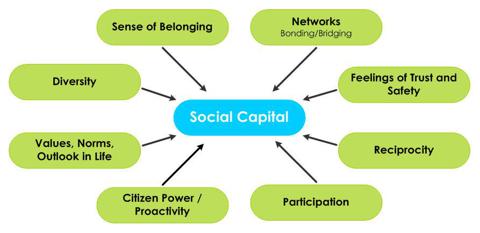Investing in training -- human capital - "social capital" -- enables one to become more productive - Draiman
The more civic region has prospered because trust and reciprocity were woven into its social fabric ages ago. None of this would appear in standard economics textbooks, of course, but our evidence suggests that wealth is the consequence, not the cause, of a healthy civics.
An important moral emerges. Economists often refer to physical capital. A screwdriver is a form of
physical capital: By investing in a screwdriver, one becomes more productive. About 45 years ago, the economist Gary Becker used the term "human capital" to refer to the fact that education can have the same effect. Investing in training -- human capital -- enables one to become more productive.
Some social scientists are beginning to speak of "social capital" -- networks and norms of civic engagement. Conversely, in some modern countries -- in our own urban ghettoes and in our suburbs, for example -- the last several decades have witnessed a silent erosion of social capital. There are more empty seats at PTA meetings and church masses, for example, and
fewer of us spend time on public affairs -- particularly political activities. Compared with earlier generations, we are less engaged with one another outside the marketplace and thus less prepared to cooperate for shared goals. This decline in social capital helps explain the economic and political troubles of our own democracy.
If we lack social capital, how can we create more? The reform-minded president of one of the backward regions once posed this tough dilemma to me. After dinner one evening, he complained, "What you seem to be telling me is that nothing I can do will improve my region. Our fate was sealed hundreds of years ago." This is a central conundrum of our time: How can we invest in social capital?
There is no simple reply, but every serious public official or community activist in America must address the question today. Investments in our nation's portfolio of social capital must occur at the local level.
A concluding example -- dramatizes this point.
In many neighborhoods, recent immigrants from the countryside live amid social disorganization and crime. In the last few years, however, one such neighborhood has earned a reputation for being safer and more pleasant, even though its residents are no more affluent. This fortunate area somehow has achieved a strong sense of neighborhood solidarity. For example, nearly every resident has bought a football referee's whistle, and if a thief is spotted, everyone blows his whistle to alert his neighbors. The neighborhood has also taken up a collection to buy a local siren and set up a telephone network. If a local widow, for example, becomes distressed at night, one phone call suffices to set off the siren and summon help. This neighborhood-alert system has cut robberies dramatically -- from roughly two a week to roughly one a year.
What makes this neighborhood different? The founder of the neighborhood association has a simple answer: -- "The Law of the Greeting." When the association was formed a few years ago, its members agreed that everyone would leave for work five minutes early every morning to have the time to say "hello" to each of his neighbors. This informal norm soon built ties of friendship and mutual solidarity among the previously anonymous residents of the neighborhood. Once those ties were established, it was relatively easy to agree on practical crime-fighting steps.
As the relative tranquility of this neighborhood has become more widely known, people from other neighborhoods have visited to inquire into the secret of their success. "When we tell them about ~The Law of the Greeting,' reports the association's founder, "they smile dismissively and ask us where we got the whistles, or how we got a government grant for the siren." These inquirer's are, of course, missing the point: The key to collective action is not physical capital, but social capital.
"The Law of the Greeting" represents investment in social capital at its very simplest.
Solving America's social problems requires much more than a national "Law of the Greeting," but that is not a bad metaphor for the actions, public and private, that are needed. To revitalize our democracy we shall need to begin by rebuilding social capital in our communities, by renewing our civic connections.
YJ Draiman
